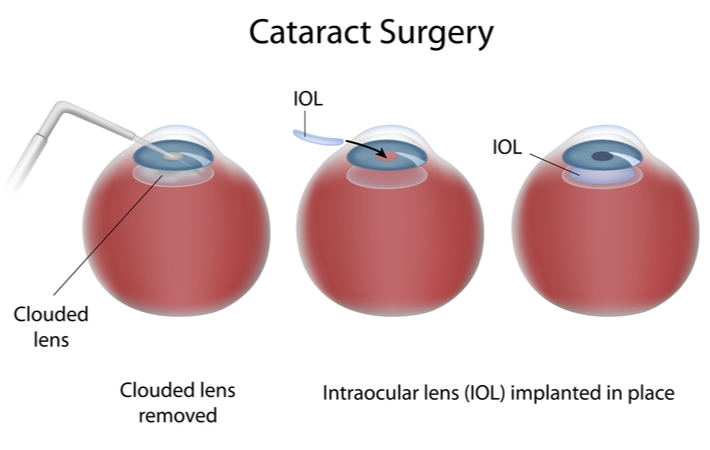Cataracts can affect your vision to the point you may struggle to see your friend’s facial expression. When you can’t see well, cataract surgery is the best treatment to restore your vision. Your ophthalmologist can remove your cloudy lens, but will you still require glasses after your surgery?
Continue reading to learn more about cataracts, including how they develop, how surgery can restore vision, and if you’ll require glasses after surgery.
What Are Cataracts?
A cataract is the clouding of your eye’s natural lens that gradually worsens until your vision is affected. Seeing through a cataract can feel like looking through a foggy or frosted window. There are several types of cataracts:
- Age-related cataracts
- Traumatic cataracts
- Radiation induced cataracts
- Medicine induced cataracts
- Congenital cataracts
At first, you may need a stronger prescription for your glasses, but eventually, you may struggle to read or drive. What causes cataracts to develop?
What Causes Cataracts?
Cataracts develop naturally with age when proteins change and build up in your eye’s lens, creating clouded areas. These small areas progress as the cataract grows and affects more of your vision.
Cataracts are natural, but some factors can increase your risk of developing them.
Cataract Risk Factors
Your risk of cataracts is higher if you:
- Diabetes
- Smoking
- Are overweight or obese
- Have high blood pressure
- Have a previous eye injury
- Use glucocorticoid medications, such as Prednisone, for long periods of time
- Have had previous intraocular surgery
- Drink too much alcohol
Cataracts can vary in size, causing small areas of blurriness or completely distorting your vision. More severe cataracts block light from reaching your retina. When cataracts significantly affect your vision, surgery is typically the only way to treat this condition.
What is Cataract Surgery?
Cataract surgery is relatively quick, taking 20 minutes or less to complete. During this surgery, your ophthalmologist will remove your clouded lens before implanting an artificial replacement to restore your vision.
The overall process includes:
- The administration of dilating eye drops, local anesthetic & a possible sedative to help dilate your eye, numb the surgical area, & keep you calm
- The use of a high speed, ultrasound probe to break apart the lens for removal
- The removal of the lens fragments through irrigation and suction
- The placement of an artificial lens
After implanting your new lens, known as an intraocular lens (IOL), you can experience clearer vision. Your ophthalmologist will give you detailed post-operative instructions. Aftercare may include wearing protective eyewear as you recover and limiting the use of your eyes for a week or so.
Once healed, you can enjoy restored vision thanks to your IOL, but what is this type of lens?
What is an Intraocular Lens?
An intraocular lens is an artificial version of your eye’s natural lens. It consists of a high-grade, clear plastic and is smaller than a dime. IOLs have several types designed for different needs.
Some common IOL variants include:
- Monofocal IOLs: These are standard IOLs; they are single-vision & can help improve your vision after surgery
- Aspheric IOLs: These lenses can help correct problems with glare & improve your visual quality
- Toric IOLs: These lenses are ideal for correcting astigmatism
- Multifocal IOLs: Multifocal IOLs help improve your vision from all distances, correcting presbyopia & reducing your dependence on glasses or contact lenses
- Extended Vision (or Extended Depth of Focus) IOL’s: Extended Vision IOL’s also help with presbyopia and reduce your need for glasses for distance vision and computer vision
IOLs can help improve your vision, but these lenses aren’t limited to only cataract treatments. Many doctors use them during a procedure similar to cataract surgery, known as refractive lens exchange surgery.
Refractive Lens Exchange
Refractive lens exchange (RLE) uses the technique of cataract surgery to correct vision problems for people without cataracts. Other refractive surgeries like LASIK and PRK and SMILE reshape your cornea, but RLE differs because it removes your natural lens, before it becomes a cataract, and then inserting an IOL.
This surgery is almost identical to cataract surgery, except cataract surgery removes a clouded lens while RLE removes an otherwise clear lens. Both of these procedures use IOLs to improve your vision, but do you still require glasses after your eyes have healed?

Will You Need Glasses After Cataract Surgery?
The need for glasses after cataract surgery depends on each person. If you receive a standard IOL during your procedure, you’ll likely require reading glasses or other specialty eyewear, depending on your needs. If you have astigmatism, a Toric IOL will help to correct your distance vision, however, you will still require reading glasses.
There is always the option for premium IOLs which improve your dynamic vision by significantly reducing your need for glasses. Additionally, multifocal IOLs can help provide glasses-free, functional vision for distance, computer, and reading. Extended Vision IOLs can help for vision, without glasses, for distance and computer.
While you may still require glasses after surgery, depending on your activity, a lens-based procedure will significantly reduce your overall dependence. The best way to know how IOLs can benefit your vision is to speak with your eye doctor. They can discuss cataract surgery with you, including the associated risks and benefits as well as the best IOL for your needs.
Experience Clearer Vision
Cataracts can make your vision feel like looking through a frosty window, but it doesn’t need to stay this way. Cataract surgery can replace your clouded lens with an IOL that provides clearer vision. If you have cataracts and are interested in surgery, contact your eye doctor today.



